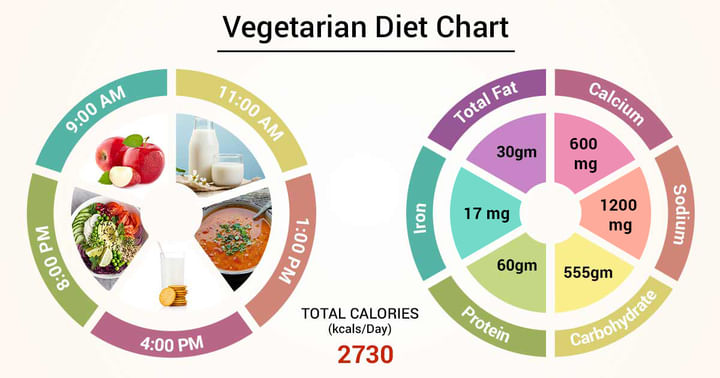Diet Chart For vegetarian
Last Updated: Nov 08, 2019
About
A vegetarian diet is a healthy way to meet the body’s nutritional needs and boost one’s health. Apart from the ethical or environmental factors, cutting meat from your diet and switching to a vegetarian diet decreases the risk of chronic disease and aid in weight loss. Research reveals that vegetarians manage to have better diet quality than meat-eaters in terms of key nutrients.
With proper planning, a vegetarian diet can fit the nutritional needs of people of all ages. To get the maximum out of the vegetarian diet, try to include a variety of plant-based food in the diet such as veggies, fruits, legumes, nuts and whole grains to feel satisfied-not starved-while cutting calories. It is also important to cut back on sugary beverages, fruit juices and refined grains at the same time to get the most out of this diet.
A vegetarian should make thoughtful choices about their diet, and consume a variety of foods to make sure that they meet the nutritional demands of their bodies. The most common types are Lacto-ovo-vegetarian diet, Lacto-vegetarian diet, Ovo-vegetarian diet, Pescetarian diet, Vegan diet and Flexitarian diet.
Thanks to the year-round availability of vegetarian food options and the growing significance of plant-based diets, becoming a vegetarian has become more accessible. Apart from eating a wide variety of fruits & vegetables, it is mandatory to replace saturated fats with good fats.
It is essential to diversify the food you eat to not miss out on essential vitamins. This is because some nutrients are found in less amount in vegetarian foods or less likely to be absorbed by the body that the non-vegetarian options. Also, it should be kept in mind that even nutritious, low-fat, plant-based foods can make a person gain weight. Hence, it's vital to read food labels to know the calorie intake and do some regular physical activity.
Diet Chart
| Sunday | |
| Breakfast (8:00-8:30AM) | 1 cup milk + 2 toasted bread + 5 almonds + 1 apple |
| Mid-Meal (11:00-11:30AM) | 1 cup buttermilk |
| Lunch (2:00-2:30PM) | 1 cup moong dal + 1 cup bhindi + 2 chapatti + salad |
| Evening (4:00-4:30PM) | 1 cup milk + 2 biscuits |
| Dinner (8:00-8:30PM) | 1 cup dal + 1 cup potato curry + 1 cup rice + salad |
| Monday | |
| Breakfast (8:00-8:30AM) | 1 cup milk + 1 cup vegetable poha + 3 walnuts |
| Mid-Meal (11:00-11:30AM) | 1 cup watermelon |
| Lunch (2:00-2:30PM) | 1 cup rajma + 1 cup gobhi aloo + 1 cup cucumber raita + 1 cup rice + 1 chapatti + onion salad |
| Evening (4:00-4:30PM) | 1 cup lemonade + 1 toasted bread |
| Dinner (8:00-8:30PM) | 1 cup arhar dal + 1 cup methi mattar + 2 chapatti + salad |
| Tuesday | |
| Breakfast (8:00-8:30AM) | 1 cup milk + 2 vegetable moong dal cheela + 5 almonds |
| Mid-Meal (11:00-11:30AM) | 1 cup watermelon juice |
| Lunch (2:00-2:30PM) | 1 cup chana dal + 1 cup soybean vegetable + 2 chapatti + salad |
| Evening (4:00-4:30PM) | 1 cup chana chaat + 1 cup lemonade |
| Dinner (8:00-8:30PM) | 1 cup moong dal + 1 cup ghia vegetable + 2 chapatti + salad |
| Wednesday | |
| Breakfast (8:00-8:30AM) | 1 cup milk + 2 suji cheela + 5 almonds |
| Mid-Meal (11:00-11:30AM) | 1 cup buttermilk |
| Lunch (2:00-2:30PM) | 1 cup white chana + 1 cup palak paneer + 1 cup rice + 1 chapatti + salad |
| Evening (4:00-4:30PM) | 1 soy chaap + 1 cup shikanji |
| Dinner (8:00-8:30PM) | 1 cup masoor dal + 1 cup snake gourd + 2 chapatti + salad |
| Thursday | |
| Breakfast (8:00-8:30AM) | 1 cup milk + 1 cup vegetable bread upma + 5 almonds |
| Mid-Meal (11:00-11:30AM) | 1 cup papaya |
| Lunch (2:00-2:30PM) | 1 cup moong dal + 1 cup tinda vegetable + 2 chapatti + salad |
| Evening (4:00-4:30PM) | 1 cup vegetable soup + 2 toasted bread |
| Dinner (8:00-8:30PM) | 1 cup soybean vegetable + 2 chapatti + salad |
| Friday | |
| Breakfast (8:00-8:30AM) | 1 cup milk +2 moong dal cheela + 3 walnuts |
| Mid-Meal (11:00-11:30AM) | 1 cup cantaloupe |
| Lunch (2:00-2:30PM) | 1 cup palak dal + 2 chapatti + 1 cup ghia raita + salad |
| Evening (4:00-4:30PM) | 1 cup sprouts salad |
| Dinner (8:00-8:30PM) | 1 cup mattar paneer vegetable + 1 cup rice + salad |
| Saturday | |
| Breakfast (8:00-8:30AM) | 1 cup vegetable idli + 1 cup sambhar + coconut chutney |
| Mid-Meal (11:00-11:30AM) | 1 cup lemonade |
| Lunch (2:00-2:30PM) | 1 cup soybean curry + 1 cup rice + salad |
| Evening (4:00-4:30PM) | 1 cup paneer tikka |
| Dinner (8:00-8:30PM) | 1 cup bhindi + 2 chapatti + salad |
Food Items To Limit
- Beef
- Chicken
- Turkey
- Gelatin
- Eggs
- Other animal-based products
Do's And Dont's
Do's:
- Eat foods rich in, or fortified with calcium
- Pair iron-rich foods with vitamin C
- Be mindful of protein: About 20% of your total calories should come from protein
Don'ts:
- Do not eat processed sources of protein
- Do not consume sugary desserts and sodas
- Do not get stuck in a diet rut
Food Items You Can Easily Consume
- Fruits
- Vegetables
- Grains
- Legumes
- Nuts
- Seeds
- Proteins
References
- Dwyer JT. Health aspects of vegetarian diets. The American journal of clinical nutrition. 1988 Sep 1;48(3):712-38. [Cited 27 June 2019]. Available from:
- Mangels R, Messina V, Messina M. The dietitian's guide to vegetarian diets. Jones & Bartlett Learning; 2011. [Cited 27 June 2019].
- Craig WJ. Nutrition concerns and health effects of vegetarian diets. Nutrition in Clinical Practice. 2010 Dec;25(6):613-20. [Cited 27 June 2019]. Available from:
Table of content
Find Dietitian/Nutritionist near me
Ask a free question
Get FREE multiple opinions from Doctors



